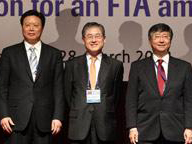Mutual trust key to further FTA talks

 0 Comment(s)
0 Comment(s) Print
Print E-mail CNTV, March 30, 2013
E-mail CNTV, March 30, 2013
China, Japan, and South Korea have finished their first round of Free Trade talks in Seoul. If reached, the agreement would form the world's 3rd largest free trade bloc and help improve the economies of all three countries and their overseas trade.
During the three-day free trade talks, representatives from China, Japan, and South Korea discussed the mechanisms and approaches for free trade negotiations.
South Korea's Deputy Minister for Trade acknowledged that while the talks were largely procedural, they were still important.
Choi Kyoung-Lim, South Korea's Deputy Minister for Trade, said, "The start of the FTA negotiations among our three countries represents a share the commitment to overcome the current political difficulties and lay down institutional basis for common prosperity and enduring friendship."
After 10 years of preparation, the three neighbours are setting out to bind their economies together which accounts for about 20 percent of global GDP, and 17.5 percent of global trade.
The trilateral agreement is expected to optimize the division of labor between the three nations, and build up an easier economic environment for businesses both at home and abroad.
Chen Jun, chairman of China-Japan-S. Korea Enterprise Promotion Committee, said, "The trilateral free trade agreement could be a good chance for Japanese and South Korean companies in China to develop. The agreement could also help reduce tariffs and cut trade costs by lowering trade barriers, and thus increase revenue."
But despite efforts to integrate the three economies, the region has long been plagued by history and territorial disputes.
Chen Jun said, "The free trade agreement is a good idea, but we still have a long way to go before we can set it up. I'm not quite optimistic about the negotiations since we don't have strong political mutual trust among the three countries, which is the precondition for healthy economic cooperation."
The three sides have agreed to hold three rounds of talks this year, with China and Japan hosting the next two.
Tang Bo said, "This week's talks did not cover any specifics, such as tariff rates or the scope of service market opening. Instead, they focused mostly on how the negotiations should be held in the future. But the negotiators believe that trust has been established among the three countries, which may play the most important role as talks move forward."





